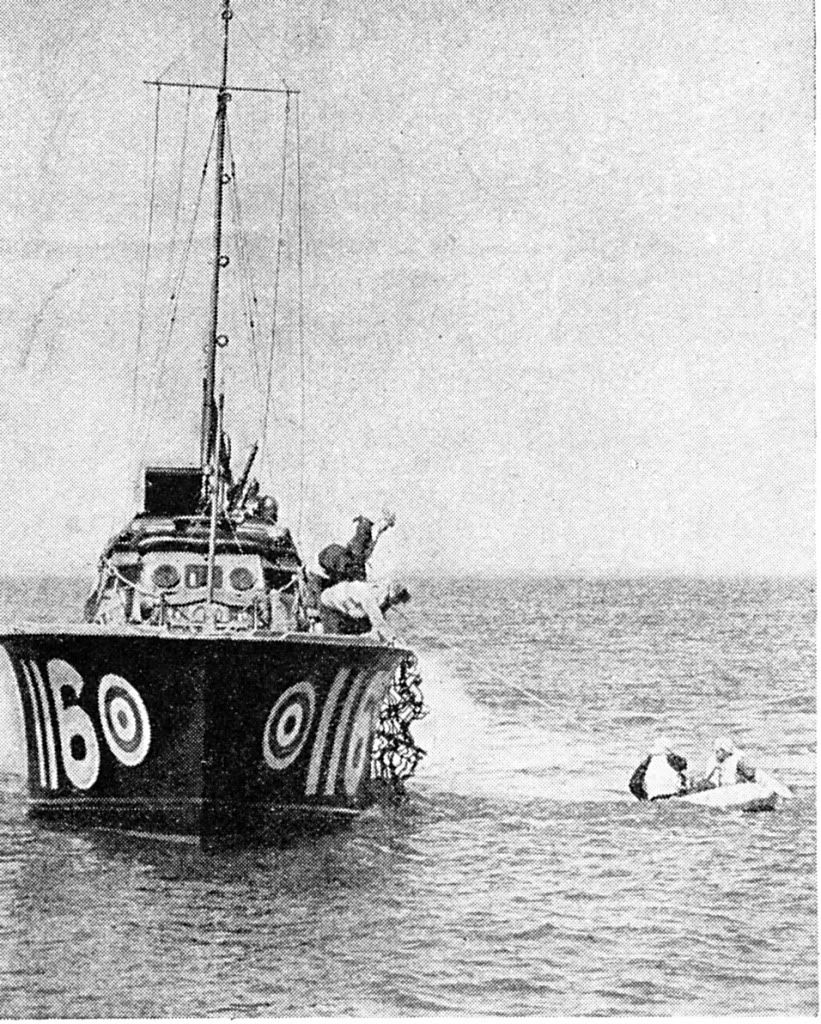Part 13 Air/ Sea Rescue.
July, 1940
FOURTEEN HOURS IN A DINGHY
BY A FLIGHT LIEUTENANT
We were a few miles off the Dutch coast on our way back from a big raid over Germany when the port engine of our aircraft cut. We had plenty of height at the time so I told my wireless operator to send out a broadcast to say we were returning on one engine. After ten minutes' flying, however, the starboard engine started missing and we began to lose height. When we were about 3,500 feet I told my operator to put out an S O S and sent the crew to their emergency stations.
There was very low cloud at the time we came out at about 500 feet. It was raining, and we did not actually see the water until we almost hit it. We tried to put the aircraft down on the water as gently as we could, but a rather heavy sea was running at the time and we hit a wave and the aircraft nose-dived in and went under. Three of the crew got out of the front hatch over the pilot's head, but the remaining three escaped from the hatch in the centre of the aircraft. It wasn't too easy for them. The others were actually under water and I could see them clutching the fuselage and trying to haul themselves up.
When we had all got into the dinghy we discovered that the rear-gunner had the wireless aerial wrapped hopelessly knotted round his neck. We had no pliers but somehow the navigator managed to lay hands on a knife with which we cut the gunner free. After four and a half minutes the aircraft went down.
The first thing that happened when we got into the boat was that the chaps got cramp. The first half hour was hell. We then decided to chuck off all the clothes we could spare. We threw away our shoes and flying boots, except the best pair, which we used as paddles and for baling out the dinghy. At the time heavy sea was running and drizzle was falling. It was a tough job getting the dinghy balanced. One of us lay in the bottom of the boat and five sat round the edge.
I was very pleased to discover that the navigator had had the foresight to salvage the Very pistol and three cartridges.
It must have been about seven o'clock in the morning when an aircraft which we took for a German flew over us. We fired a Very light but it took no notice of us and went on. Two hours later another aircraft, this time a British plane in search of us, flew straight over the top of us, but despite our signals did not see us. We then discovered that the Very cartridges had become swollen owing to the water and we had to spend about half an hour tearing off pieces of cardboard until we eventually got one to fit the pistol.
We tried to steer a course due west hoping to reach England by paddling with the shoes, when at eleven-twenty we sighted another aircraft coming straight towards us. We waited until he was close and then fired a Very light�our last one, which the pilot spotted. He dived over us and then we recognised the machine as one of our own squadron. He circled round us for about two and a half hours and now and then sent messages with a signalling lamp saying that help was coming. But help didn't come until about four o'clock in the afternoon when we spotted an R.A.F. speed-boat coming towards us. Two and a half hours later we were landed.
It was a pretty thick fourteen hours I can tell you, but some�how or other we managed to keep our spirits up, even after we discovered a leak in the dinghy and had to get the front gunner to stick his toe in it.
The rear gunner sang to us for an hour and a half without stopping�Scottish songs, and finished up by swinging them. We also had a sweepstake as to what time we should be picked up, which was won by the wireless operator. Unfortunately, he was hours out�on the wrong side. But I still think the longest hours were whiled away by an argument we had about the wire�less operator who said he had been born with a caul and therefore couldn't be drowned�even though he could not swim. He was right after all.

Collapsible rubber dinghy automatically ejected from aircraft brought down on the sea.

Air/ Sea Rescue Service at work.